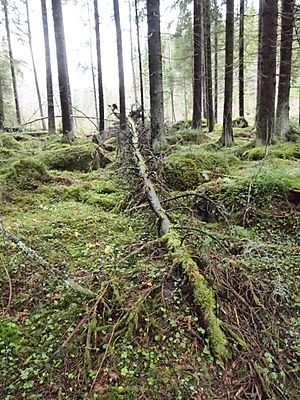If a tree falls in a forest facts for kids
"If a tree falls in a forest and no one is around to hear it, does it make a sound?" This is a famous thought experiment. It makes us think about how we observe things. It also makes us wonder about what we perceive.
Contents
What is Sound?
Does sound need a listener?
The main idea of this riddle is about sound. Does sound truly exist only if someone hears it? Or does it happen even if no one is around?
From a science point of view, when a tree falls, it creates air waves. These waves are a physical event. They can be measured by tools. This event happens whether a person is there or not.
But what about "sound" as we hear it? Our ears turn these air waves into something we perceive as sound. So, if no one is there to hear, the air waves still happen. But the "sound" that we experience might not.
Sound waves vs. perceived sound
Think about it this way:
- Sound waves are physical vibrations. They travel through the air. These waves exist even if no one hears them.
- Perceived sound is what our brain creates. It happens when our ears pick up those waves. This "sound" needs a listener.
So, a falling tree always makes air waves. But whether it makes "sound" depends on how you define sound. If sound means "something heard," then no, it doesn't make a sound. If sound means "air waves," then yes, it does.
Does Observation Change Reality?
Does seeing something change it?
This riddle also makes us ask: Does watching something happen change the way it happens? Most people and scientists believe that observing a tree fall doesn't change if it makes air waves.
However, it's hard to prove this for sure. Some ideas, like the anthropic principle, suggest that just by existing, an observer might affect what they see.
What if no one ever knows?
Imagine an event that no one ever sees or hears. It doesn't leave any trace. It doesn't affect anything else. In that case, is there any difference between that event happening or not happening at all?
For example, if a tree falls but no one ever knows it fell, it's almost like it never happened. But the fact that we are even asking the question means we know the tree changed. It went from standing to fallen.
A philosopher named Roy Bhaskar once said something important. He believed that if people stopped existing, sound waves would still travel. Heavy things would still fall. Even if no one was there to know it. This idea suggests that things exist in the world independently of us. They don't need us to see or hear them to be real.
How We See Things vs. How They Are
What's the difference between real and apparent?
The riddle also helps us think about the difference between what something truly is and how it seems to us.
If a tree exists without us seeing it, how can we know it's there? What does "existence" even mean then?
- Reality is how things are. A tree is a tree. It has certain properties.
- Perception is how we experience things. We see the tree. We hear the sound.
When a tree falls, it creates sound waves. These waves are a physical thing. But these waves won't actually sound like anything if no one is there. The mechanical part of sound happens. But the feeling or sensation of sound does not. This shows a difference between the physical world and our experience of it.
See also
 In Spanish: Si un árbol cae en un bosque para niños
In Spanish: Si un árbol cae en un bosque para niños


